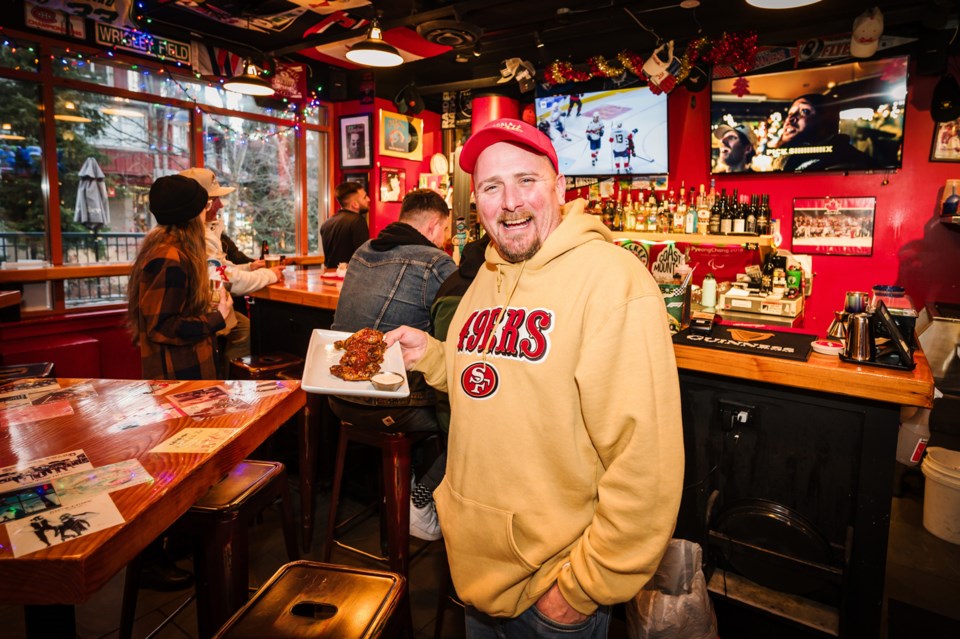When Jeremy “Stinky” Peterson opened his own sports bar, Stinky’s on the Stroll, in 2019, he saw it as a love letter to his hometown. Five years later, and the love affair may be coming to an untimely end.
“I don’t want to say that I’m leaving, but it is time to start realizing maybe it is time to go somewhere else,” Peterson said. “It just tells you that independent businessmen like myself can’t make it in Whistler.”
Facing sky-high rent in a prime piece of Whistler Village real estate, Peterson is considering selling the pub that was named locals’ favourite hangout four of the past five years in Pique’s Best of Whistler poll.
The primary factor, Peterson said, is the escalating rental rate squeezing his margins.
When he first opened, he said he was paying $65 a square foot to rent the space. Today, Peterson pays $110, amounting to roughly $15,000 a month in rent. Under a new deal proposed by his landlord, that rate would move to $125/sq. ft. in Year 1, $135 in Years 2 and 3, and $145 in Years 4 and 5.
“I’ve raised my prices, but I can’t justify it to myself that I'm going to have to start charging you $10, $12 for a bottle of beer,” Peterson said.
Peterson’s decision on the future of the pub comes on the heels of what he called the worst shoulder season he has seen since the pandemic, a period that appears to have hit Whistler’s restaurant sector especially hard.
“The fall has been the worst for us, and everyone else is saying it might be the worst one yet [since COVID-19],” said Eric Griffith, co-owner of Alta Bistro and president of the Restaurant Association of Whistler. “You’re getting pushed into this situation where you’re just covering your business because it’s not profitable at all right now. We’re looking at Christmas to save us.”
Despite strong snowfall to start the season, “the current business environment is very challenging for entrepreneurs, especially small, locally owned businesses,” said Louise Walker, executive director of the Whistler Chamber of Commerce.
“We hear variable feedback on the outlook for this winter and there is some concern for local businesses successfully making it through a soft winter. The costs that businesses face are continuously escalating, with labour, supplies, rent, property tax and more. The costs have all built up, and at the same time, with the current cost-of-living challenges, we can’t keep raising prices for the consumer to absorb. We need to find ways to lower the cost of doing business, which is likely a combination of government policies and commitment to economic development at all levels of government.”
In a recent chamber survey, fewer businesses in 2024 feel they are in a very good or good place compared to last year. More than 80 per cent of respondents expect the cost and ease of doing business in Whistler will get worse over the next four years, a significant increase since 2023. There is also increasing concern over local businesses closing due to rising costs.
Looking back to the summer, Tourism Whistler said room night bookings were down three per cent in May compared to the same month last year; June was down six per cent; July was flat; and August was up three per cent. September bookings were up nine per cent, bolstered by visiting conference groups, while October was flat with last year.
“All of that netted out to be approximately flat [over that six-month period],” said Tourism Whistler president and CEO Barrett Fisher. “We’re still by no means surpassing 2019 levels, but it’s overall a strong year.”
While the visitors are still coming, cost-conscious consumers aren’t opening their wallets the way they used to, said Fisher, which is impacting Whistler’s restaurant, retail and activity sectors particularly.
“Maybe three years ago or pre-pandemic, you might see visitors coming and they are purchasing an appetizer and a bottle of wine, and now maybe they’re passing on the appetizer and having a glass of wine,” Fisher added. “We are definitely seeing different expenditures in different sectors.”
Looking ahead to the winter, a time resort business owners count on to cover the shoulder seasons, Fisher said room night bookings are pacing “a little on the softer side compared to last year.” Part of that is likely the lingering effect of last year’s poor snow season, particularly with Vail Resorts’ Epic Pass giving guests the option to book their ski vacation at one of its more than 40 resorts based on where the snow is, Griffith posited.
“We need snow. We need big-time, headline-making snow and we need that shorter-haul U.S. domestic visitor—whoever—to come up and get skiing. We need this place to get filled up with the late decision-maker,” said Griffith. “I don’t know if that’s exactly what’s happening here but definitely people are making decisions later now than they were.”
While Fisher acknowledged Tourism Whistler has seen some softening in key overseas markets such as the U.K. and Australia, there is strong demand from American and Mexican visitors whose currency compares favourably to the Canadian dollar.
As for Peterson and the future of his beloved bar, he’s not quite ready to throw in the towel on a passion project he has poured considerable resources and sweat equity into.
“Part of me wants to try to keep Stinky’s alive and maybe move it somewhere else in town. But where? I’m tired. I bust my balls. I work my ass off,” he said. “Pretty soon this whole town will just become one big chain because a guy like me can barely hang on.”




